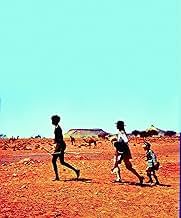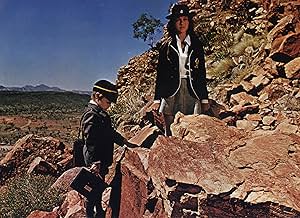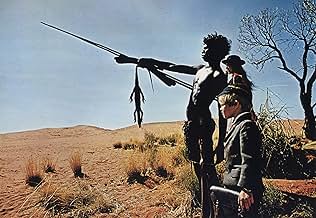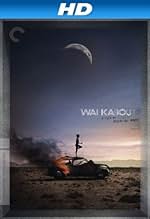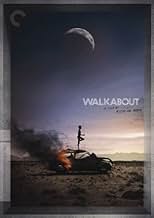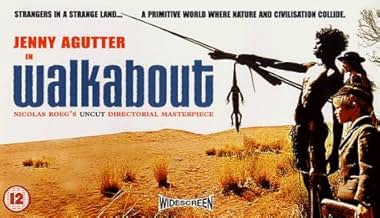Un frère et une soeur sont abandonnés dans le bush australien, obligés de s'en sortir seuls. Ils rencontrent un garçon aborigène en plein "Walkabout", un rite de séparation de sa tribu.Un frère et une soeur sont abandonnés dans le bush australien, obligés de s'en sortir seuls. Ils rencontrent un garçon aborigène en plein "Walkabout", un rite de séparation de sa tribu.Un frère et une soeur sont abandonnés dans le bush australien, obligés de s'en sortir seuls. Ils rencontrent un garçon aborigène en plein "Walkabout", un rite de séparation de sa tribu.
- Réalisation
- Scénario
- Casting principal
- Récompenses
- 1 victoire et 1 nomination au total
- Black Boy
- (as David Gumpilil)
- Man
- (as Robert McDara)
- No Hoper
- (as Pete Carver)
- German Scientist
- (as Noelene Brown)
- Radio Announcer
- (voix)
- (non crédité)
Avis à la une
*** 1/2 (out of 4)
A girl (Jenny Agutter) and her young brother (Luc Roeg) find themselves in the Australian outback trying to survive after being left out there. Soon they run across a hunter (David Gulpilil) who is out there on a "walkabout."
Nicolas Roeg's WALKABOUT is without question one of the greatest looking films that you're ever going to see. I've often said that this film did for the outback what Stanley Kubrick's 2001: A SPACE ODDYSEY did for space. I mean, whenever you think of a dessert setting your mind can't help but go to the images on display throughout this poetic look at struggle.
For my money the greatest thing done by Roeg is just the atmosphere and setting that he creates. There's not too much dialogue but what really moves the film is the beautiful music score and cinematography. The images that we view are breathtaking from the opening scenes to the closing ones. The stuff in the outback is beautifully captured and there's no doubt that the setting comes to life. The music score also perfectly captures the innocence and beauty of everything going on.
The performance by the three leads are another major plus. Agutter rightfully became a name after this picture and it's easy to see why. The role here certainly isn't flashy but the actress is able to do so much with such little dialogue. Her eyes certainly tell you everything you need to know and there's a very intelligent performance. You can see her intelligence without her saying a word. Both Roeg and Gulpili are equally as great in their supporting roles.
WALKABOUT is certainly a very poetic film that has some of the greatest images that you're ever going to see. It's really a film full of life and the way it plays out holds your attention from start to finish.
On a less superficial level it is a film with a point-something along the lines of the graciousness of Aborigines and their ability to live in harsh surrounds, and the destructive nature of suburban life in a flat in a major city.
I think it would be a film, like Jedda, that will always be on reference for the Australian Outback, Aboriginals and the modern society which brought a European civilisation to their land.
To expect Roeg not to dwell on images is to expect Tolstoy not to go off on 20-page rants about how the lack of Napoleon would necessitate another to fill his historical role. One overlooks idiosyncracies in one's friends.
I found the movie much more powerful than I expected. My only disappointment with the Criterion DVD release is with the commentaries. I would love to have heard more about the story, and it would have been nice to have heard from David Gulpilil, whose role as the aborigine was a watershed in Australian cinema, as noted in the IMDb article on his career.
Le saviez-vous
- AnecdotesLuc Roeg was actually sun-burnt in the scene where the aboriginal boy treats his back by rubbing him with fat from a wild boar. Director Nicolas Roeg thought it would make a good scene for the film so he picked up the camera and shot it.
- GaffesThe credits name the actor playing "Black Boy" as David Gumpilil. It should be David Gulpilil.
- Citations
Narrator: [last lines - from "Poem XL" by A.E. Housman's "A Shropshire Lad"] Into my heart an air that kills, From yon far country blows: What are those blue remembered hills, What spires, what farms are those? That is the land of lost content, I see it shining plain, The happy highways where I went, And cannot come again.
- Crédits fousAfter the credits, there is a flash of white light on the screen and as it becomes a black screen, radio tuning is heard while the words "rien ne va plus" are shown.
- Versions alternativesA director's cut of this movie was released in 1997 with 5 additional minutes. This cut is identical to the original British release version (100 minutes): the film was shortened by five minutes for its original American release.
- ConnexionsEdited into Terror Nullius (2018)
- Bandes originalesElectronic Dance
Written and performed by Billy Mitchell
Meilleurs choix
- How long is Walkabout?Alimenté par Alexa
Détails
- Date de sortie
- Pays d’origine
- Langues
- Aussi connu sous le nom de
- Encuentro de dos mundos
- Lieux de tournage
- Sociétés de production
- Voir plus de crédits d'entreprise sur IMDbPro
Box-office
- Budget
- 1 000 000 $AU (estimé)
- Montant brut mondial
- 1 888 $US


